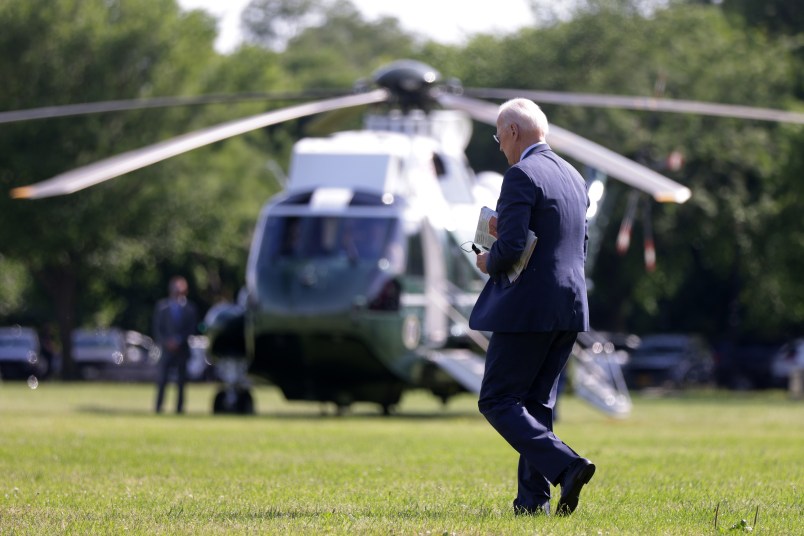I’ve written over many years that despite the seesawing of control in Congress and executive branch, Washington remains wired for the GOP. We’re seeing another striking example of that in the way most establishment DC press outlets are are treating the brouhaha over President Biden’s alleged ‘veto threat’. We started with Biden stating openly what all the parties to the proposed bipartisan legislation know, which is that for Democrats it’s a package deal. Democrats know that. Republicans know that. The reporters know that. And yet the same folks have decided to take the feigned Republican freakout entirely at face value regardless. Politico of all places was closer to the mark on Friday when they noted that it took a day for Republicans to realize they were upset and what about.
And it’s actually accelerated over the weekend.
Yesterday the conventional wisdom among DC reporters was that yes this was all known. But Biden stated it too openly. So it was excessive candor that upset a fragile bipartisan coalition rather than any change of strategy or position. But hear Annie Linskey in the Post last night: “President Biden on Saturday reversed a stand he had taken forcefully just two days earlier …” The weekend clarification statement has now gone from being a fuzzy and ambiguous statement muddying up linkage to an abject surrender after a forceful assertion of a new policy.
Or Alayna Treene and Hans Nichols in Axios (emphasis added) …
The bipartisan deal — which Biden both endorsed and threatened to reject in the same breath — is hanging by a thread, just days after the group of 21 Democratic and Republican senators celebrated a deal.
Biden spoiled the party by saying he viewed the $579 billion package as linked to a second, potentially $6 trillion-dollar package Democrats want to pass through the partisan reconciliation process.
The president tried to clean up the mess in a rare Saturday statement that all but contradicted his Thursday threat. “The bottom line is this: I gave my word to support the infrastructure plan, and that’s what I intend to do,” he said.
This copy might as well be written by the RNC.
What is this about?
There are a lot of different factors. But the underlying dynamic is bothsidesist reporting philosophy and the inherent advantage it gives to whichever side of a debate lies more or more aggressively feigns outrage over fictive sleights.
The reality of the situation I think is that at least half the notionally committed eleven Republican Senators were highly uncomfortable with the deal they had signed on to – in large part because they knew Democrats planned to pass the rest of their agenda through reconciliation. This is both a policy problem and a political one. It enables policy they don’t support and it fails to advance their core political agenda of damaging Joe Biden’s standard in advance of the 2022 and 2024 elections. Weeks ago Republicans had openly embraced the idea that by agreeing to a bipartisan mini-bill they could break the coalition supporting Biden’s more ambitious agenda. But late June though all the players on the Democratic side were clear that the two bills had to pass together or neither would. Biden’s comment was what Republicans latched on to to explain or justify why they were totally positively ready for a bipartisan deal until this comment somehow changed everything.
We remain where we were. This remains a negotiation among Democrats, particularly Joe Manchin and Joe Biden over the terms on which Biden and Chuck Schumer can bring together 50 Democratic Senators to pass his infrastructure agenda. Republicans are instrumentalities in that discussion but not parties to it. The emerging model has been a bipartisan mini-deal coupled with a bigger package passed through reconciliation. That checks the bipartisan box which Democratic centrists insist on while allowing an overall package of the scale the rest of the party can support. If the mini-deal breaks down, we’re back to Manchin having to decide whether he tanks the whole agenda, gets Republicans back on board or goes along with passing the whole package passing through reconciliation. Fundamentally it’s a negotiation within the Democratic caucus.






